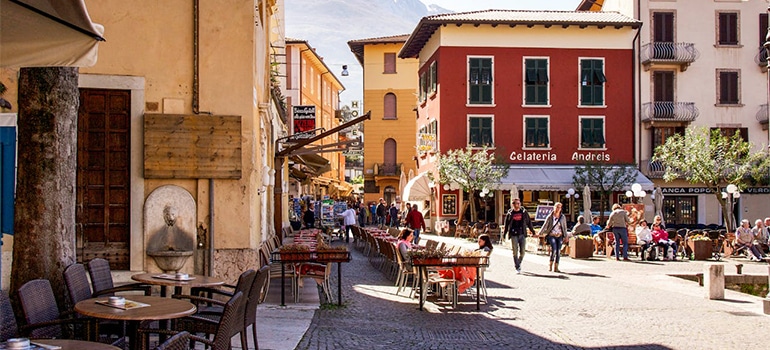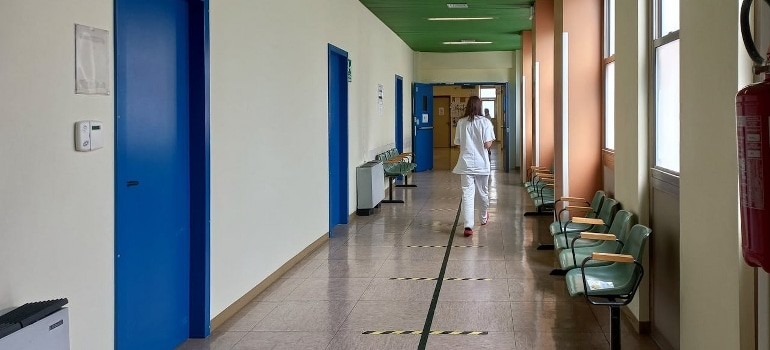The Life-Extending Benefits of Moving to Italy

Get a Free Moving Quote Now!
Start Your International Moving Journey





Moving somewhere new can do more than change your view. It can change your lifespan. Italy consistently ranks among the top countries for life expectancy, with Italians living an average of 83.5 years, according to the OECD. That’s three years longer than the U.S. average. The life-extending benefits of moving to Italy aren’t a dream—they’re a product of daily habits, environment, and access to care. This post breaks down ten core reasons why people who relocate here tend to live healthier, longer lives. If you’re craving more than just a lifestyle upgrade, moving to Italy could be exactly what your body needs.
What Makes The Mediterranean Diet So Powerful?
Diet is one of the most researched factors in longevity. Italians don’t follow fad diets. They follow tradition – and it works. International movers say clients often cite the food as a top reason they chose Italy over other countries. The Mediterranean diet, common across Italy, has been linked to a 25% reduced risk of heart disease, according to Harvard research. Olive oil, a staple ingredient, contains monounsaturated fats that help reduce LDL cholesterol. Fish like sardines and anchovies provide omega-3s, essential for heart and brain function. Italians consume around 26.5 kg of vegetables per person annually, compared to just 20.4 kg in the U.S.

Wine, consumed in moderation (typically 1 glass per day), improves HDL cholesterol levels and helps reduce blood clotting. Pasta isn’t banned—it’s balanced. Meals aren’t drenched in sauces or cheese but focused on fresh ingredients, fiber, and satisfaction. Over time, this diet lowers inflammation, supports gut health, and stabilizes blood sugar. Living in a country where every market encourages this way of eating makes healthy choices the default.
How Does Italy’s Lifestyle Reduce Daily Stress?
Stress is a slow killer. But in Italy, life is designed to buffer it. Moving to Europe from USA often shocks Americans used to 60-hour workweeks and unpaid time off. In contrast, Italy mandates 20 paid vacation days per year—plus 11 national holidays. The average Italian workweek is just 36 hours. Lunch breaks often last two hours, with businesses closing so employees can go home or relax. This isn’t laziness. It’s health preservation. Chronic stress is linked to heart disease, immune dysfunction, and depression, especially for newcomers who haven’t yet adapted to life in Italy and its slower, balanced rhythms.
Cortisol levels stay high when people skip rest. In Italy, that’s rare. Social connections are prioritized. Conversations over espresso matter more than inbox zero. A 2022 Gallup poll found that only 19% of Italians report daily stress, compared to 49% of Americans. Add in a culture that discourages overwork, and you’ve got a recipe for healthier hearts and clearer minds. You don’t need a spa—you need a piazza, a friend, and time to breathe.
What’s The Health Impact Of Daily Movement?
Exercise doesn’t need to come with a gym membership. One of the life-extending benefits of moving to Italy is that it happens naturally. Moving to Italy means adjusting to a layout that supports movement. International household goods movers recommend leaving behind that treadmill—because your new town will handle the cardio. Walkable neighborhoods, pedestrian-only zones, and stairs in historic hill towns make physical activity part of daily life, and these patterns vary depending on the city you choose in Italy Italians average 5,500 steps per day, and in smaller towns, that number often exceeds 8,000. Compare that to the U.S. average of just 3,000 to 4,000.

Grocery shopping happens on foot. So does socializing, commuting, and errand running. The post-dinner stroll, or passeggiata, is a tradition in nearly every village. These habits build cardiovascular strength, regulate blood sugar, and keep joints limber. It’s also safer. With fewer highways and more community walkways, daily motion doesn’t feel like a chore. It’s freedom. You’ll burn calories without realizing it. And your body will thank you every step of the way.
Why Do Social Bonds Matter So Much For Longevity?
Want to live longer? Don’t live alone. Italians have some of the highest intergenerational living rates in Europe. Many people who relocate to Italy find themselves spending more time with family, whether intentionally or not. In 2023, 62% of Italians over 75 lived with family members, compared to only 6% in the U.S. This connection isn’t just emotional—it’s physical health support. People with strong social networks are 50% more likely to survive serious illness, according to Stanford researchers.
Daily contact lowers depression, increases motivation to stay active, and improves immune function. Italians still meet for Sunday meals, talk to neighbors, and maintain lifelong friendships. Older people aren’t isolated in suburbs or nursing homes—they’re part of the neighborhood. Longevity depends on relationships. And in Italy, those are as regular as morning coffee.
Do Italians Sleep Better—And Does It Matter?
Sleep isn’t a luxury in Italy—it’s a priority. And it shows in their health. After international moving cost shocks fade, expats often report better sleep within months of relocating. Why? Italians respect sleep cycles. Work schedules rarely extend into the late evening. Dinner starts earlier in the south, and screen time is lower than in the U.S., especially among older people. A 2021 EU study found that 68% of Italians get 7 or more hours of sleep per night, compared to only 54% of Americans.

Better sleep improves memory, repairs tissue, balances hormones, and strengthens immunity. Towns and cities are quieter at night, too—fewer sirens, less nightlife disruption, and no 24-hour delivery trucks. Siestas may be fading, but rest isn’t. When your body knows when it’s safe to power down, it heals more efficiently. Over a lifetime, that leads to fewer chronic conditions and longer, sharper mental function.
Why Is Local Food A Game Changer?
Supermarkets in Italy feel different for a reason. The shelves don’t stretch with 50 brands of one item. Instead, they focus on freshness, not quantity. Once your container shipping services deliver your items, your first visit to a local market will reveal what your body’s been missing. Local farmers supply most fruit, vegetables, cheese, and meat. That reduces chemical preservatives and increases vitamin retention. Italians consume 94 pounds of fruit per person per year—20% more than Americans.
Seasonal eating also means fewer pesticides and more nutritional diversity. Eggs come from nearby coops. Olive oil is pressed a few towns over. That matters. A University of Florence study found that people who eat locally grown food have 40% lower rates of obesity and metabolic syndrome. Your gut microbiome, which controls immune health and digestion, thrives on this kind of diet. You’re not just eating differently—you’re living differently, and it starts with your plate.
How Do Italians Avoid Overeating Without Dieting?
Diet culture isn’t as pervasive here as it is in the U.S. Italians aren’t obsessed with weight-loss programs or calorie-counting apps, and many people find they naturally adapt to portion sizes without even trying. That’s because Italian meals prioritize quality over quantity. Plates are smaller. Courses are paced. And food is shared. The average Italian consumes 3,600 calories per day, only slightly more than Americans. But their obesity rate is just 10%—less than half of the U.S. rate of 22%.

Why? Mindful eating. Italians don’t rush meals in their cars. They don’t graze all day at their desks. Meals happen at tables, often with others, and include conversation. That slows down the eating process and allows satiety signals to work. Sugar consumption is also lower. Italians average 27 grams per day, compared to 71 grams in the U.S. These small changes prevent overeating and reduce chronic disease risks over time.
Does Clean Air Actually Help You Live Longer?
Clean air isn’t just a perk—it’s a public health necessity. Italy offers better air quality than many industrialized parts of the world, especially in rural areas. People relocating to countryside towns or coastal villages often report improved breathing within weeks. In southern regions like Basilicata and Abruzzo, PM2.5 levels (fine particulate pollution) average just 12 µg/m³—well below the EU limit of 25 µg/m³ and much lower than cities like Los Angeles (20+) or New York City (18+).
Cleaner air reduces asthma, bronchitis, and lung cancer risk. It also supports heart health. A 2020 WHO study showed that long-term exposure to high PM2.5 levels shortens life expectancy by up to 2.2 years. Living in a place where your lungs aren’t constantly under siege gives your entire cardiovascular system a break. Breathing clean air isn’t glamorous, but it keeps you alive longer.
How Does Italy’s Healthcare System Promote Longevity?
Healthcare costs in the U.S. are the top cause of bankruptcy. In Italy, they’re mostly nonexistent. After moving to Italy, many are surprised to find that even private care is affordable. Italy’s public healthcare system (Servizio Sanitario Nazionale) provides universal access funded by taxes. Office visits cost around €30, specialist visits around €50–€70, and emergency care is free. Prescription drugs are often €1–€10. Preventive care is routine.

Mammograms, colonoscopies, vaccinations, and blood tests are encouraged and often state-funded. Because care is accessible, chronic conditions get caught early. That leads to fewer hospitalizations and longer lives. Life expectancy in Italy is 5 years longer than in most U.S. states. And unlike the U.S., you’re not afraid to go to the doctor because of cost. That peace of mind is part of what keeps Italians living longer, healthier lives.
Why Do Older Italians Age With Purpose?
Purpose fuels longevity, and Italians don’t lose theirs with age. Moving to Italy puts you in a country where elders aren’t sidelined. They’re central. Older people participate in daily life, not in isolated senior communities. They tend gardens, volunteer, teach cooking classes, and walk grandchildren to school. Italy ranks second in Europe for retirees participating in civic engagement. A 2022 ISTAT report found that 38% of Italians over 65 volunteer regularly.
That kind of engagement reduces depression, boosts cognitive function, and keeps people physically active. You’ll see people in their 80s riding bikes, chatting in cafés, and shopping for fresh herbs. They’re not outliers—they’re the norm. And that sense of belonging helps people stay alive longer. When you feel useful, you fight harder to stay well.
How Can Americans Quickly Adapt And Enjoy The Health Benefits?
Cultural shock is real, but it fades faster when you lean into the lifestyle. Many Americans move expecting Italy to feel like a slower version of home. It isn’t. And that’s a good thing. The quicker you drop the U.S. pace, the quicker your body starts reaping rewards. You’ll walk more, eat differently, and connect with people in ways that might feel strange at first. That discomfort? It’s the feeling of breaking old habits. Once you push through, the life-extending benefits of moving to Italy start kicking in. Here’s how to make the transition easier—and healthier.

Tips For Embracing The Italian Way Of Living
Here is how to reap the life-extending benefits of moving to Italy quickly:
- Walk to the market daily instead of doing weekly grocery hauls
- Eat full meals at the table—no screens, no rushing
- Shop at outdoor markets and learn what’s in season locally
- Replace processed snacks with fruit, nuts, or olives
- Prioritize lunch as your biggest meal, and eat lighter in the evening
- Limit screen time after dark to help reset your sleep cycle
- Join community events—even if you barely speak the language
- Use public transport or a bike instead of driving everywhere
- Visit local doctors and register with the national health service early
- Learn basic Italian phrases to make conversations smoother and less stressful
Living Longer Isn’t a Dream—The Life-Extending Benefits of Moving to Italy Are Real
The life-extending benefits of moving to Italy don’t rely on theories or wellness trends. They come from the structure of everyday life. Shorter workdays mean less stress. Fresh food supports your gut and heart. Walkable streets build exercise without effort. Sleep improves naturally. Social connection replaces isolation. Medical care is preventive, accessible, and affordable. There’s no single secret—just a country that still prioritizes health through rhythm, not restriction. When you put your body in the right environment, it does what it’s built to do: heal, move, rest, and last. That’s why relocating here isn’t just appealing—it’s practical.
